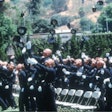Recently a reader contacted me about a personal dilemma. He told me his department issues a certain make and caliber of pistol and he doesn't like it. He further stated he did not like the holster, in addition to a laundry list of other items he was issued. What could he do now as his agency's newest rookie?
How would I deal with these unpleasant events? I'll tell you.
Deal With It
First and foremost, deal with it. Each department selects and issues equipment for its own reasons, not yours. There are some agencies where officers may purchase and select their own weapons, but this is not the case for the officer who contacted me. Sometimes you are issued equipment that you don't like—sorry. I asked the officer if he was aware of the issue duty gun prior to taking the job. "Yes," he said, "But…" There are no buts here. Deal with it and adapt.
Train to Live, Not to Whine
If you are uncomfortable with the weapons system (weapon, ammo, and holster) that you are issued, then train harder and train smarter. Accuracy is what does the job. I don't care if you have a fire breathing, maxed out, loaded magnum plus. You have got to put the projectile in a location of the body that will successfully stop the aggressive action. 'Nuff said.
Comfort level with the handgun not there yet? Then learn as much as you can about it. Research all you can about the weapon, care, maintenance, and how to maximize your working knowledge of it. You cannot avoid this instrument just because you don't like it. You must master your weapon, and then your confidence will improve.
Go to the Range and Train
Notice I said train, not punch little holes. Put yourself under the realistic pressures of police work, not marksmanship. Keep all of the safety rules and do drills under the guidance and recommendations of your rangemaster.
Run and shoot in all conceived firing positions. Daylight, twilight, and night time; don't forget inclement weather either. You work in the rain and snow? Train in them as well. Practice your failure drills and know how to return the weapon back to a functioning weapon. Practice both right handed and left handed shooting. Shoot from cover. Then let the rangemaster get creative with you.
Do failure drills, tactical reloading, and shooting from various positions. The point here is that you are training for tactical survival, not just slinging lead.
With an empty weapon (double check it) practice your drawing skills. It should become second nature. In martial arts I was told that it takes thousands of repetitions to make anything a skill. If my Sensei read this, he would tell you for a technique to become a skill takes tens of thousands of repetitions, and then only if you can perform it under all known situations as well as the "what to do" situations.
The Rest of the Stuff
I'm not going to discuss the rest of the "stuff" (yes that is a technical term) that you are issued right now. The biggest worry, if it is a true worry, is the weapons system that you are issued. I don't know why, but this is always number one with officers. Master their use and stay proficient with them.
There are many things in life we have no control over. Instead of dealing with it by whining, deal with it by undergoing realistic training. Then you will also conquer your fears and misgivings. Who knows? You might just like that handgun after all.














